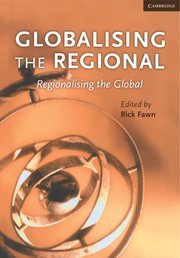Book contents
- Frontmatter
- Contents
- Preface
- Notes on contributors
- ‘Regions’ and their study: wherefrom, what for and whereto?
- Theoretical and thematic approaches
- Regional cases
- The resurgence of the ‘region’ and ‘regional identity’: theoretical perspectives and empirical observations on regional dynamics in Europe
- 6 The contradictions of regionalism in North America
- Latin America: contrasting motivations for regional projects
- The Southern African security order: regional economic integration and security among developing states
- East Asian regionalism: much ado about nothing?
- The Commonwealth of Independent States: an example of failed regionalism?
- Index
The Southern African security order: regional economic integration and security among developing states
Published online by Cambridge University Press: 05 June 2012
- Frontmatter
- Contents
- Preface
- Notes on contributors
- ‘Regions’ and their study: wherefrom, what for and whereto?
- Theoretical and thematic approaches
- Regional cases
- The resurgence of the ‘region’ and ‘regional identity’: theoretical perspectives and empirical observations on regional dynamics in Europe
- 6 The contradictions of regionalism in North America
- Latin America: contrasting motivations for regional projects
- The Southern African security order: regional economic integration and security among developing states
- East Asian regionalism: much ado about nothing?
- The Commonwealth of Independent States: an example of failed regionalism?
- Index
Summary
Abstract. Theories in international relations, predicated on particular assumptions, for explaining the relationship between regional economic integration and regional security miss the challenges to security in the developing world. Unlike the developed world, regional interdependence in much of the developing world engenders negative externalities. The relationship between regional economic integration and regional security depends on the nature of the security threats that define the region – traditional state vs state threats on one hand versus new security threats on the other hand. The nature of the security threat, or security dilemma, will determine how different forms of regional economic integration, laissez faire, functional, and developmental, define or re-define a particular regional security order. Building a ‘security community’ in the developing world, therefore, calls for new architectural principles. In the case of southern Africa, both, laissez faire (free trade area) and functional cooperation (spatial development initiatives) will foster insecurity rather than security.
Introduction
While the study of international security has broadened to include non-state threats such as, economic underdevelopment, immigration, small arms proliferation, HIV/AIDS, and weak states, theories explaining the generation of these new security threats have not escaped the state-centric assumptions of traditional international relations theory. The processes generating security or insecurity operating beneath, across, or above the state point us in a different direction – away from a focus on the state itself and in the direction of regional security.
- Type
- Chapter
- Information
- Globalising the Regional, Regionalising the Global , pp. 189 - 214Publisher: Cambridge University PressPrint publication year: 2009



